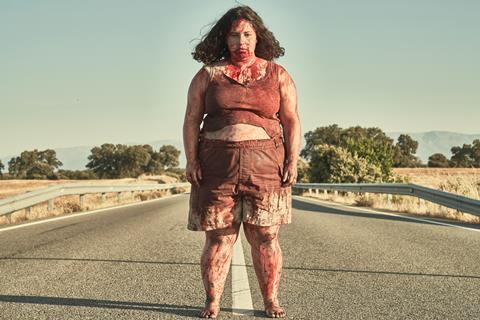Spanish filmmaker expands her short film into a bold, bloody and insightful feature

Dir/scr: Carlota Pereda. Spain/France. 2021. 100mins
Built around a sterling central performance by Laura Galán as an overweight teen who is offered an unexpected chance to take violent revenge on her bullies, Carlota Pereda’s feature debut Piggy smartly mashes up thriller, rural drama and comedy elements into a lovingly-crafted, potently atmospheric, and thought-provoking whole — with bucketsful of horrible blood thrown in for good measure.
It’s away from the plot that Piggy is at its most compelling and subtle
Following its Sundance outing, deserved truffles in the form of further fest appearances and niche theatrical releases are likely for a film which manages to be both audience-friendly and authentically unsettling, whilst also signalling Pereda as the latest female talent from a Spanish industry that still finds room for too few.
The opening scenes follow pretty much to the letter Pereda’s 2019 Goya award-winning short of the same name. Teenager Sara (Laura Galán), known to her bullies as Piggy, lives a shamed and sheltered life with her parents, amiable butcher father (Julián Valcárcel) and sharp-tongued mother (Carmen Machi), in a small eastern Spanish pueblo during a boiling hot summer. Thus visually framed by hanging hams and chorizos from the start, Sara takes a secret siesta-hour trip to a local pool where she is taunted and nearly drowned by a trio of female bullies in scenes that are painful to watch.
Forced to walk home almost naked along empty roads, she happens on a truck driven by the bare-chested and also somewhat tubby Unknown Man (Richard Holmes), who is clearly up to no good; and through the truck window, Sara sees her tormentors pleading for help. Torn between trying to assist them and ignoring their plight, a brief and entirely unexpected gesture of tenderness from the Unknown Man prompts Sara to choose the latter. Because, let’s be honest, it’s probably exciting for a tormented teen to see the bodies of her shamers covered in blood.
That’s where Pereda’s brilliant short ends, raising a thousand unanswered and intriguing questions which the feature so entertainingly answers. Piggy channels its darkness into thriller tropes, as the night-time search for the missing girls, headed by a comically inept father-son team, begins. Tensions rise in this pueblo where nothing ever happens; when night falls, the action shifts mainly to the surrounding woods, home to what looks like an abandoned abattoir. Inevitably, Sara herself, forever the victim, becomes the object of the town’s suspicions. But tensions rise slightly less inside the viewer, because although it’s all expertly worked though by Pereda’s attentive script, the storyline remains pretty close to the conventional.
It’s thus away from the plot that Piggy is at its most compelling and subtle. The character work is terrific, and the dynamics of Sara’s family are hilariously observed. Nobody does the traditional, ever-nagging Spanish matriarch better than Machi: a scene between Sara and her mother featuring a dishwasher and a refrigerator is one of the film’s best, and certainly its funniest. Likewise, there’s real warmth and Almodóvar-like affection in its portrayal of the details of life in one of those Spanish villages — the sun-baked plazas, the statues of the Virgin, the endless gossiping — which depends for its existence on dead meat (aka hunting and bullfighting), which also make it the perfect setting for the gory finale that awaits us.
This is Sara’s film. Featuring in practically every scene, she is played with remarkable commitment by Galán (who is in fact in her thirties) in the kind of role that one imagines might have represented a personal as well as a professional challenge. Her transformational, empowering identification with the Unknown Man, based on their mutual desire to wreak havoc on the world, is Piggy’s most interesting strand, and slowly blossoms into a strange relationship. (At some level, Pereda is drawing a dark parallel between serial killers and body shamers, who both see other people as just meat.)
That initial tender gesture from him is worked up into a bizarre, complex, and intriguing two-hander based on Sara’s belief that far from being a killer, the Unknown Man is her saviour, and it’s made even more compelling by the fact that there’s barely a word of dialogue between them. At one point, Pereda daringly frames them together as lovers against a sky lit by fireworks.
Technically, Piggy is very solid. Rita Noriega’s camerawork is wonderfully evocative of the complex dance of light and shadow that is summertime in rural Spain, whilst also handling well the visual conventions required — for example, a shot of a throat being cut elides, as it must, into another of a melon being sliced. The sound work is also key, while Olivier Arson’s score is suitably discordant.
Production companies: Morena Films, Backup Studio
International sales: Charades carole@charades.eu; XYZ nate@xyzfilms.com (US)
Producers: Merry Colomer, David Atlan-Jackson, Jean-Baptiste Babin, Joel Thibout
Art direction: Óscar Sempere
Editing: David Pelegrín
Cinematography: Rita Noriega
Music: Olivier Arson
Main Cast: Laura Galán, Richard Holmes, Carmen Machi, Julián Valcárcel, Irene Ferreiro, Camille Aguilar, Pilar Castro, Claudia Salas, Irene Ferreiro






![The Brightest SunScreen[Courtesy HKIFF]](https://d1nslcd7m2225b.cloudfront.net/Pictures/274x183/3/5/0/1448350_thebrightestsunscreencourtesyhkiff_312678.jpg)















![The Brightest SunScreen[Courtesy HKIFF]](https://d1nslcd7m2225b.cloudfront.net/Pictures/100x67/3/5/0/1448350_thebrightestsunscreencourtesyhkiff_312678.jpg)

